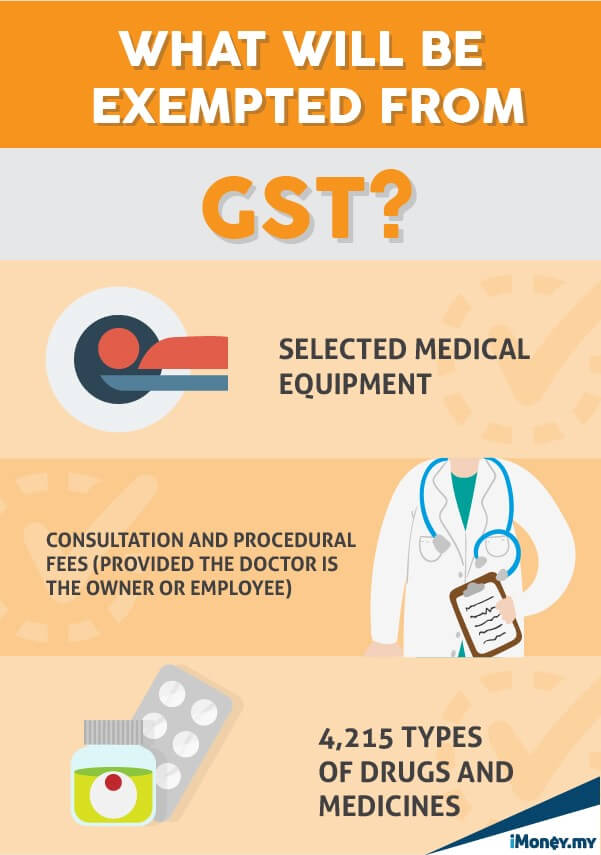GST: Will We Pay More For Healthcare Services Now?

One of the greatest icons that walked this earth, Mahatma Gandhi believed that health is the greatest wealth. It is our right to have access to affordable healthcare. However, it is also true that most Malaysians prefer private healthcare, for faster service. Private healthcare doesn’t come for cheap, though.
According to AKPK, one of the primary reasons that Malaysians are burdened with debt or face bankruptcy is due to high medical expenses. Moreover, the need for healthcare becomes even more important as we age. Currently, the medical inflation rate in Malaysia is estimated to be around 15%.
In Budget 2015, our Prime Minister assured the people that healthcare will be exempted from the Goods & Services Tax (GST), but will we still see more expensive healthcare now?
Firstly, if the turnover of taxable supply exceeds RM500,000, it is compulsory for a private healthcare provider to register GST.
Healthcare services by both Government and private healthcare facilities will be charged GST according to the order below:
What are exempted from GST?
Health services registered under the Private Healthcare Facilities and Services Act (PHFA) are GST exempt. If the healthcare premises are not registered under PHFA, the services provided will be charged 6% GST.
Generally, healthcare services provided by private healthcare facilities will be exempted from GST. All consultation and procedural fees under PHFA will be exempted from GST as long as the doctor is the owner or an employee of the facility.
What are charged GST?
All procedures outside the PHFA will be charged GST, such as
1. Locum fees
Doctors in private facilities that are not an employee or owner of the facility, but operate as independent consultants are categorised as ‘outsourced services’. Therefore, their consultation and procedural fees would be taxed 6% GST.
2. Supplements and nutritional products
Sales tax of 5% on supplements will be replaced with 6% GST and nutritional products will be charged GST, on top of import tax.
3. Aesthetics
Cosmetic surgery treatment which is solely for beauty purposes and does not have any connection to improve health will be subject to 6% GST. However if these services are provided by the healthcare facility for a health purpose, it is exempted from GST.
4. Medicines and medical equipment that are not exempted
All machines, equipment and medicines or drugs will be subject to 6% GST, unless exempted.
5. Pharmaceutical, traditional and complementary medicine services
Pharmaceutical services as well as traditional and complementary medicine services not provided by the Government or private healthcare facilities will be charged 6% GST.
6. All outsourced services
Outsourcing services that are related to healthcare services is subject to 6% GST. The GST charged by the outsource companies to the healthcare facilities can be claimed by the supplier if they are a registered under GST, such as laundry, food catering, laboratory and imaging.
Non healthcare related services is subject to 6% GST but input tax cannot be claimed by the healthcare facilities, such as hygienic cleaning, security, canteen and parking services. This includes:
- Rental or leasing of operational theatre, office space, clinics, retail shop, florist or medical equipment, etc.
- Seminar and training for the use of medicals professional expertise in seminar or training courses.
- Fitness and well-being programmes, such as gymnasium, spa, sauna and slimming centre or massage parlour).
As private healthcare doctors would likely have to pay GST for some of the goods and services from their suppliers, but would be unable to claim the tax as private healthcare falls under the exempt supplies list, they will most likely raise their consultation fees to cover whatever GST payment they make.
How will all these affect us?
A. Government facility
At present, all registered medication is exempted from any sales and services tax. However, the price of selected medication was set to rise when the GST is implemented. It will go up further when the cost of administrating the GST is passed down the line. Even patients in Government healthcare facilities who require these medications, will end up paying more.
B. Private facility
Many opt for private facilities for treatment fearing the long queues and waiting time in public facilities.
The cost of inpatient care in private hospitals will be lower when GST is implemented. The current service tax of 6% imposed on lodging and meals provided to patients in the ward will not be subject to GST.
However, the concept of independent consultant doctors in private hospitals, the existence of multiple layers of middle-men agencies like Managed Care Organisations (MCOs) and insurers collecting and processing fees will affect the cost of private healthcare. With the many levels involved in healthcare services, imposing GST on them would not only be costly and complicated in terms of administration but will cause the cost of healthcare to escalate across the board. Patients will end up paying much more after GST for the same treatment. This will have a major adverse impact on the national expenditure on healthcare.
On top of this, health insurance is equally charged 6% GST. So yes, the cost of healthcare will increase, especially for ones visiting private facilities.
The ones that will feel the real pinch out of all these will be parents with young kids and aged individuals will require more medical attention.








